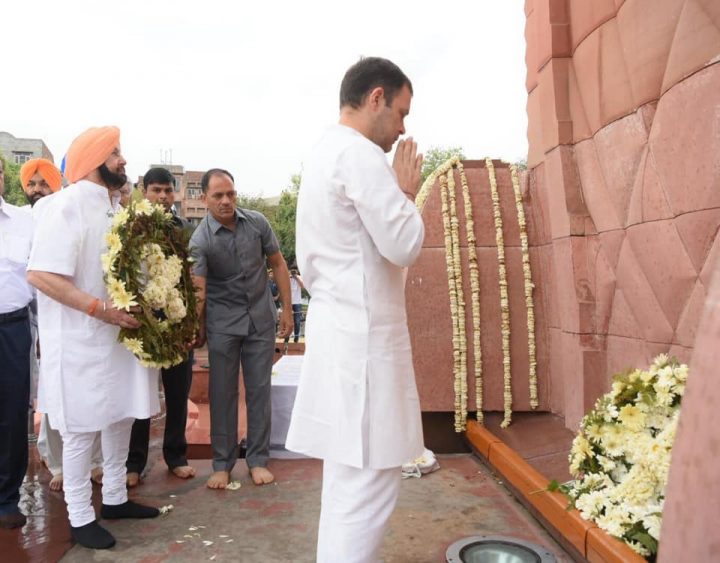On Saturday, April 13, 2019, India remembered and paid tribute to those who lost their lives in the Jallianwala Bagh massacre that took place on this day 100 years ago.
The president of India, Ram Nath Kovind said, “100 years ago today, our beloved freedom fighters were martyred at Jallianwala Bagh. A horrific massacre, a stain on civilisation, that day of sacrifice can never be forgotten by India. At this solemn moment, we pay our tribute to the immortals of Jallianwala.”
Prime Minister Narender Modi tweeted, “Today, when we observe 100 years of the horrific Jallianwala Bagh massacre, India pays tributes to all those martyred on that fateful day. Their valour and sacrifice will never be forgotten. Their memory inspires us to work even harder to build an India they would be proud of.”
Today, when we observe 100 years of the horrific Jallianwala Bagh massacre, India pays tributes to all those martyred on that fateful day. Their valour and sacrifice will never be forgotten. Their memory inspires us to work even harder to build an India they would be proud of. pic.twitter.com/jBwZoSm41H
— Chowkidar Narendra Modi (@narendramodi) April 13, 2019
Furthermore, opposition leader Rahul Gandhi, president of the Congress Party, and Punjab Chief Minister Amarinder Singh on Saturday led people in paying heartfelt tributes to the martyrs of the Jallianwala Wala Bagh massacre by visiting the place in Amritsar where the atrocity took place.
The two leaders laid floral wreaths at the historic Jallianwala Bagh National Memorial here as a mark of respect for those who sacrificed their lives in the service of the nation, on April 13, 1919, in one of the worst bloodbaths in India’s pre-independence history.
“The cost of freedom must never ever be forgotten. We salute the people of India who gave everything they had for it,” the Congress President later wrote in the visitor’s book at the memorial, which stands tall as a symbol of the nationalism that continues to live in every Indian’s heart.
British Prime Minister Theresa May has recently said that the United Kingdom “deeply regrets” the 1919 massacre and called it a “shameful scar” on British-Indian history. But the people of both India and Pakistan are still angry over the issue and demand a full apology for the gruesome attack on unarmed protesters peacefully gathered in Amritsar in 1919.
To quote her fully, Theresa May said in parliament, “The tragedy of Jallianwalla Bagh in 1919 is a shameful scar on British-Indian history. As her Majesty, the Queen said before visiting Jallianwala Bagh 1997, it is a distressing example of our past history with India. We deeply regret what happened and the suffering caused.”
Rejecting the regret expressed by the British prime minister as inadequate, Punjab Chief Minister Captain Amarinder Singh on Friday demanded an unequivocal official apology from Britain for the Jallianwala Bagh massacre. Calling the tragic event “a heart-wrenching moment in India’s history”. The Chief Minister said in an informal chat later to the media that the people of India wanted an unequivocal apology from Britain for the atrocity. The Punjab State Legislative Assembly also passed a resolution demanding the same, he pointed out, adding that the tragedy was one of the most horrific examples of colonial excess and the massacre was a moral blot on the face of Britain.
Pakistan’s Information Minister Fawad Chaudhry also recently demanded that the British Government apologise ahead of the 100th anniversary of the mass killing.
“Fully endorse the demand that British Empire must apologise to the nations of Pakistan, India and Bangladesh on the Jallianwala Bagh massacre and the Bengal famine…these tragedies are the scar on the face of Britain, also Koh-e-Noor, must be returned to Lahore museum, where it belongs,” Fawad Chaudhry, Federal Minister for information and Broadcasting Government of Pakistan tweeted.
Fully endorse the demand that British empire must apologise to the nations of Pakistan, India and Bangladesh on Jallianwala Massacre and Bengal famine .. these tragedies are the scar on the face of Britain, also KohENoor must be returned to Lahore museum where it belongs
— Ch Fawad Hussain (@fawadchaudhry) 11 April 2019
The brutal massacre took place in the backdrop of the tyrannical Rowlatt Bill, which aimed to curtail civic liberties and the subsequent Satyagraha launched by Mahatma Gandhi Ji, when thousands had come to Amritsar to celebrate Baisakhi. The crowd assembled peacefully at the Bagh to condemn the arrest of two national leaders Satya Pal and Saifuddin Kitchlew when they were fired on indiscriminately by the monstrous British general, Reginald Dyer, and his men. The shooting continued for ten minutes claiming 379 lives, while according to government estimates, 1,200 were wounded in the firing, although the real figure of for the number killed is believed to be over 1,000.










